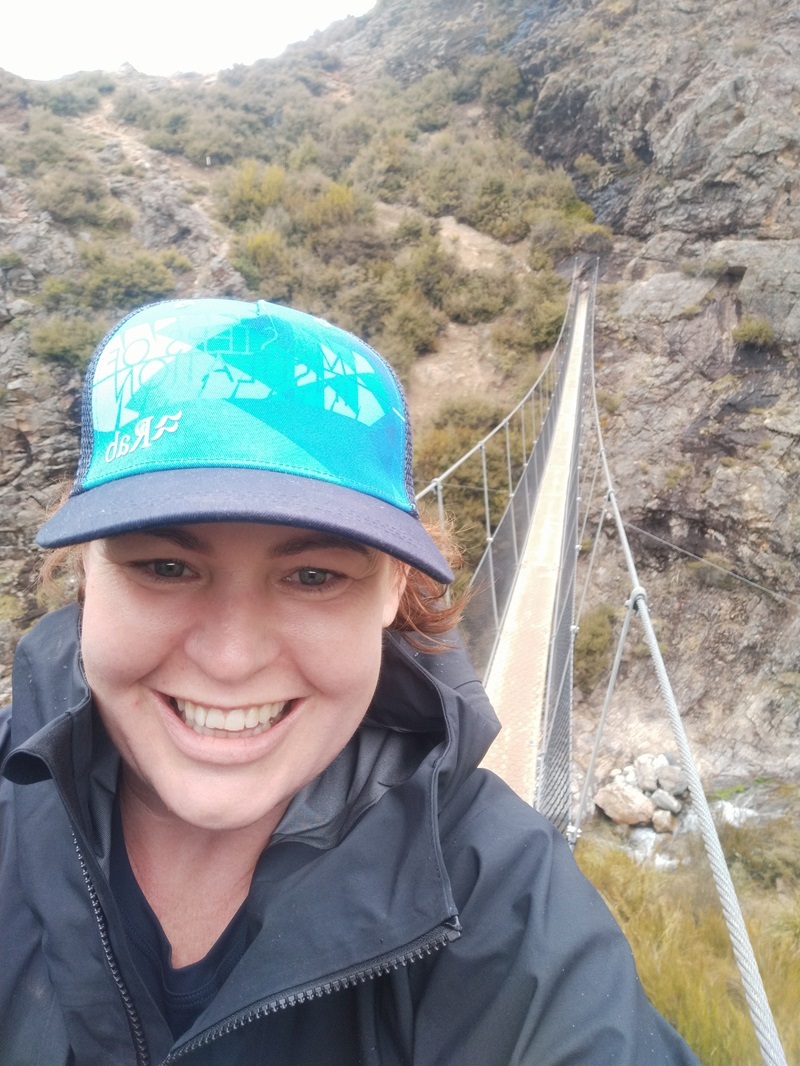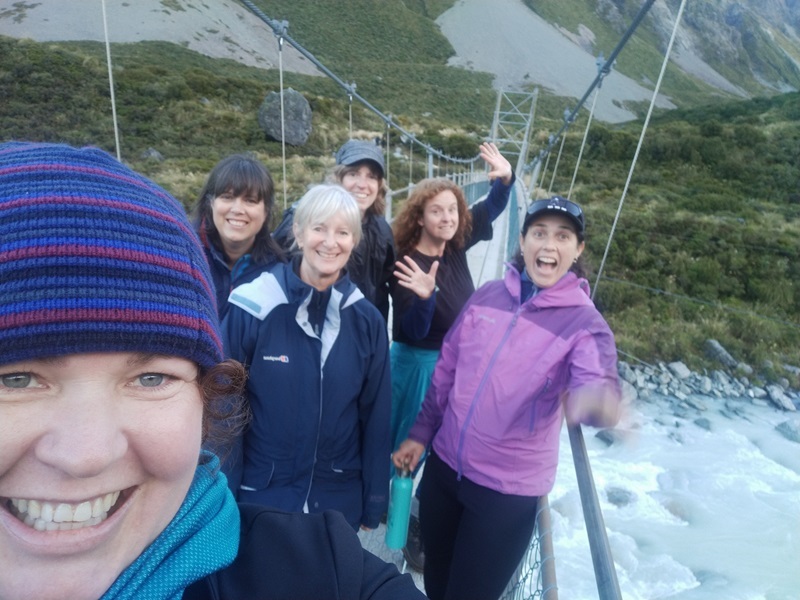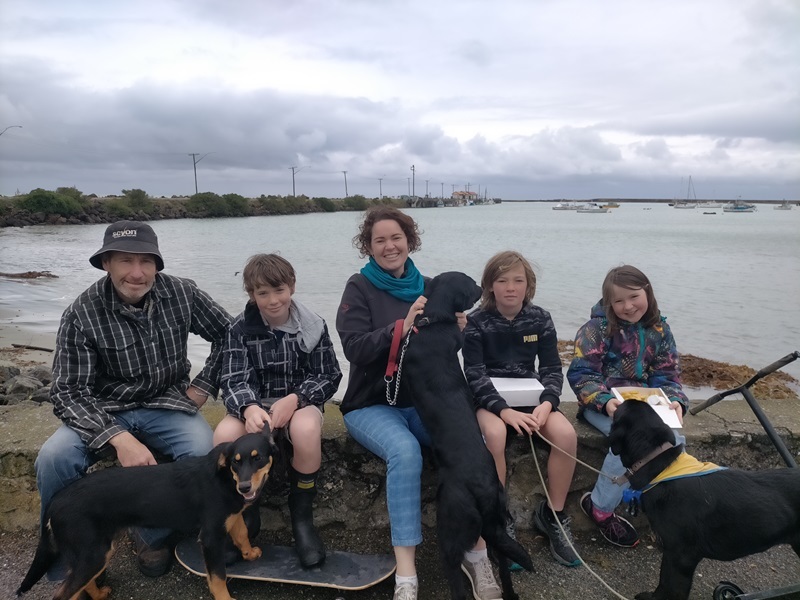Old Ghost Road pilgrimage like 'microcosm' of life with MS
Ashley Smyth
15 March 2024, 12:36 AM
 Kirsten Dixon is living with multiple sclerosis, and will be hiking the 85km Old Ghost Road track starting this Sunday. Photos: supplied
Kirsten Dixon is living with multiple sclerosis, and will be hiking the 85km Old Ghost Road track starting this Sunday. Photos: suppliedTalking to Ōamaru woman Kirsten Dixon, you can’t help but be struck by her vibrancy. You can tell she is a woman who loves life. (8-minute read)
She is also a woman who has multiple sclerosis (MS).
Kirsten was diagnosed almost exactly three years ago, at age 42, but she probably had the neurological disorder for about 20 years before she knew what it was. Something she says is not uncommon.
“So you sort of might have little sensory indications, neuropathic pain, because the form of MS that I have, which is relapsing remitting multiple sclerosis, is episodic, so you can have an episode.”
MS happens when your immune system attacks the myelin (protective coating) of your central nervous system, and that can be anywhere in the brain, spinal cord, or optic nerve.
These attacks or relapses cause inflammation and lesions on the nerve fibres, and scarring occurs as they heal. With progressive MS - deterioration is much faster.
“Multiple sclerosis actually means many scars, that's what it translates to, which makes a lot more sense as to what it is. So people with MS have many scars in the central nervous system.
“And what that means is that it can become increasingly difficult for your brain to send messages to different parts of your body, depending how significant those lesions are, and how many there are. So, MS can look very different for every person with it, I guess, depending on where, and how severely, and how good your brain is at creating new neural pathways.”
Kirsten was finally diagnosed after she lost sensation from her hips down during a major relapse in March 2021.
“A lot of the time, [I was] just completely numb. Sometimes something similar to pins and needles, but constant over a number of days. However, it didn't affect my function. So I could walk, I could drive my car - I just couldn't actually feel my legs or my feet.
“At first it was kind of amusing and I thought I'd, like, pinched a wee nerve . . . so I spoke with a good friend of mine who's also an osteopath, and when I rang her, she said, ‘no, you need to go see your GP’.”
It was decided Kirsten needed an operation, and at the hospital she was sent for a “quick” pre-surgery MRI so the orthopaedic surgeon could see exactly what was going on and where it needed to be fixed.
“I spent three hours in that MRI . . . So they kept calling over the speaker to say, we're just going to do the rest of your spine now, and now we're going to do your brain.”
Kirsten knew then, the radiologist had found something different from what they had been looking for, and that they were now looking for something else.
“I just chose at that time to think, ‘well, I'm actually in the best place I can be’. I was really scared, but what can you do?”
The next day she was told she had multiple sclerosis, but at that stage she didn’t really know what that meant.
Kirsten’s then lack of knowledge, is why she is eager to share openly about her condition now.
MS is relatively common in New Zealand - an estimated one in a thousand people have it. It is more prevalent in Caucasian people, and also in colder climates. There are more people with MS in the South Island than the North.
“That's a really high number of people. And it strikes people in their prime, between ages of 20 and 40 predominantly, and mostly women, not limited to women, but on the whole, the majority are women,” she says.
For many with MS, the condition is “invisible”.
“We're living with a disability that other people cannot necessarily support us with, unless we learn to speak up and say what our needs are. And we're kind of conditioned to not do that - I'm still learning.”

Kirsten completed a two-night solo hike at Mt Somers in November last year.
Determined to make the most of her mobility while she still has it, this weekend Kirsten is planning to walk the Old Ghost Road on the West Coast, an 85km track from Lyell Gorge to Seddonville. She will complete the walk with her good friend Kim Burgher, who also lives in Ōamaru.
It is a five-day, four-night hike, and she has been supported in her preparation by Mastering Mountains - a charitable trust set up to support people with neurological conditions - particularly MS and functional neurological disorder (FND) - and help them with outdoor adventures.
Mastering Mountains was created in 2015, by Christchurch man Nick Allen, an avid lover of the outdoors, and himself a sufferer of FND.
It offers funding for mentoring and physical rehabilitation to give people the tools, strategies and gear they need to overcome obstacles their condition might create, and enable them to sustain long-term access to the outdoors.
Kirsten is one of three recipients of a 2023 expedition grant. The group meet regularly to support and encourage each other towards their goals, and their stories are all up on the Mastering Mountains website.
“For some people some goals have needed to change as well, so we just journey that with people as new information comes to light,” she says.
Kirsten’s spirituality is important to her, and as a way to stay positive with her MS, she had been considering a Camino de Santiago walk - a type of spiritual pilgrimage. However, she requires monthly IV infusions of an immunosuppressant medication in Dunedin to help keep her MS in remission, so a trip to the other side of the world is not an option.
“So, when I read about the Mastering Mountains grant, I was really challenged to see how I thought I could curate a pilgrimage that is available to me.
“Instead of feeling sorry for myself that I can't go and do what thousands of pilgrims do every year, I said, ‘well, what would it look like to create one for me that I can do?’ And I stumbled across the Old Ghost Road.”
The Old Ghost Road is a long-forgotten gold miners’ road which, over a number of years, has been revived as a mountain biking and tramping trail. It connects the unfinished old dray road in the Lyell (Upper Buller Gorge) to the Mokihinui River in the north.
She discovered the story behind the trail’s construction, and the years of effort, driven by a man named Marion Boatwright, that had gone into completing it.
“They ended up taking these deviations and creating these other ways and finding these solutions, and as I read about that, I actually felt really connected to it, because I was like, ‘oh, that's what my central nervous system's doing’.
“It's like there's this map, but actually there's like these landfalls here and there's these reasons we can't get here, and my body, my brain, is so clever, that it's creating new ways to create that path.
“So my goal is, as I walk that - because there's these massive viaducts and swing bridges and windy steps and all these things that are beautiful, and they've built them, and I'm like, ‘wow, that's a little bit like my insides, you know?’, like, I don't have to see this as something awful. My body is doing the very best that it can, to keep me mobile and walking - and so I'm going to go walk, while I can, for as long as I can.”
Kirsten has required more training than she initially thought, and Mastering Mountains has fully funded personal trainer and nutritionist Mel Smith and exercise physiologist Stacey Pine, who both work out of Ōamaru’s The Movement Hub, to help her.
“Man, they are experts in their field, and I'm so grateful and in awe of the amount of research that they've done into neurological health for me,” she says about the two women.
“It's all evidence-based research, which is super important to me.”
She has been working with Mel and Stacey for nine months, and at the same time is receiving mentoring and coaching from Nick Allen personally, around preparation and decision making when living with neurological disease.
“Because we can experience cognitive decline quite quickly sometimes. So that's been super helpful and really motivating.”
Kirsten completed a solo hike into Mount Somers in November last year for two nights, to learn self-reliance and to reassure herself of her capabilities.

Adventuring with friends.
“I've walked with so many different people, people I know, people I don't know, and we've had so many different adventures . . . it's created a bit of a community and other people have then gone on and done other walks . . . Which is part of the contagious nature of being outdoors that I think Nick and the Mastering Mountains Trust really hope for.”
Living with MS can look different for every person who has it, depending on where the lesions form.
Kirsten is grateful none of the lesions have affected her brain so far, although she still occasionally experiences brain fog, similar to what people have experienced post-Covid, she says. She has an MRI every six months to keep an eye out for possible new ones.
She isn’t angry it took so long for her to get a diagnosis. While she had a long history of neuropathic pain, with sensory changes and cognitive decline, those symptoms can indicate a number of things, she says.
“So the diagnostics of it is challenging until it's, I guess, until it's obvious.
“It gave me a lot of relief though, because I presented in hospital numerous times over 20 years, and with no clear answer: ‘Yes, we think there's something not right, but now it seems much better’, and that was unsettling for me.
“And so to actually have a name for it was relieving, though I also would rather not have MS.”
It’s hard to know if being diagnosed sooner would have had any benefits. Disease modifying therapies are improving all the time, and the medication she is on at the moment would not have been available 20 years ago.
What ifs are also no help to Kirsten mentally, although she remembers the frustrations when she was having an episode, and she would wonder if there was something wrong with her psychologically.
“I think the emotional and psychological toll of that was quite hard for me, and also I think that again is not uncommon, and it's just something that we need to live with.
“I really believe that every specialist who has worked with me has had the intent to do their very best.”
She is also aware, if she had been diagnosed earlier, her family might look quite different.
“I have three children, and actually, if I had been diagnosed when I was younger, pregnancy is a risk factor for a relapse.
“My neurologist is amazing at empowering us to make our own decisions, but with a lot of information around that . . . it may really have brought about some very different decisions, and my kids are perfect, and they’re meant to be here.
“I know some younger women who are making decisions about what [MS] means for the size of their family.”
Kirsten describes her children - Alex, 14, Josh, 13, and Louisa, 11 - as “amazing, resilient, gorgeous, young people”.

The Dixon whānau (from left) Trent, Alex (14), Kirsten, Josh (13), and Louisa (11). Photo: supplied
“I don't think I can ever really know how finding out their mum has a chronic illness has or will impact them. I'd like to think that it inspires them, but I'm sure at times it's very hard for them too.”
Every time Kirsten has a relapse, even after it goes into remission, it leaves residual damage. She is always trying to stay well to avoid them. There are lifestyle recommendations to follow, but she can be doing everything right, and they will still happen.
She is particularly affected by cold weather, which brings on symptoms - and also times of high stress and change.
“And then sometimes, just because.
“I still experience neuropathic pain in my right leg when I'm fatigued or particularly tired or cold.
“I'll experience something that we call foot drop, so a lack of control over my foot, or I'll start to maybe scuff my foot. I have a very interesting twitch in my shoulder that sometimes flares up.”
Kirsten “quite likes to fix things” and so her MS diagnosis is one she struggles to get her head around.
“There is no cure, and despite my best efforts, it is likely to progress in my body.”
She is still coming to a level of acceptance about that, knowing at some stage down the track she will probably need mobility aids or to use a catheter, and potentially have to give up her career in dispute resolution and communications coaching - a job she loves.
“It's been a very interesting parallel journey for me to look at really . . . I support people to live the best life that's available to them, and now I have professionals who help me do that in a very different way with a very different skill set.
“It feels sort of, it's not directly reciprocal, but there's something that helps me recognise my place in the world in that, and how we are really all inter-related and that inter-reliance is very, very important. You can't do it all by yourself.”
Kirsten is excited about beginning her walk on Sunday. The weather is looking “perfectly overcast”, and what will be, will be, she says.
“I know that I will find some challenges and some hard things along the way, and I know that they'll be different to what I think they're going to be, and this is the story of life.
“It's like a wee microcosm of life, and that's what pilgrimage means to me, to go out on a journey, be prepared to encounter something, and to overcome it.”
After the Old Ghost Road, she wants to continue adventuring as long as she can, and find new challenges and ways to keep active, as her MS progresses.
Kirsten sees her diagnosis as “information about what might not be available to me in my future”.
“So, instead of saying, ‘oh, one day I'd quite like to go tramping’, or ‘in the future I think I would like to . . .’ I'm just pulling them forward and going, ‘well, if I'm serious that I want to do them, then I need to do them a bit sooner’.
“These things might be available to me for a very long time, and I hope that they are, but I'm also aware that if I, you know, eventually do need mobility aids or support in other ways, there is still a full life available to me, just not some aspects of life.
“So yeah, it's probably made me realise too to focus on what I can do and not what I can't.”
For more information on multiple sclerosis or to donate, visit the website here.
To find out more about Mastering Mountains or to donate visit the website here




